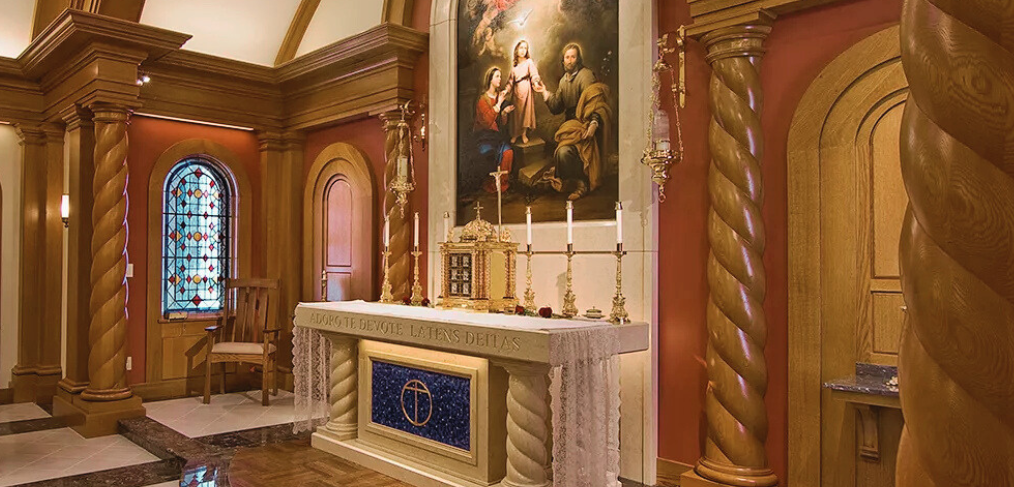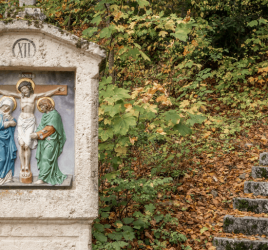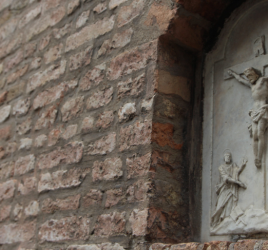
Safe, Calm, and Loved: An Invitation
Go perseveringly to the Tabernacle, either bodily or in your heart, so as to feel safe and calm: but also to feel loved… and to love!
St Josemaría Escrivá
The Forge, no. 837
One of the highest compliments we can pay to a place is to say: I feel at home here. Welcome, belonging, wanting to go and be at home are sentiments deeply rooted in the human heart.
We find the theme repeated in songs and poetry, from the sentimental “I’ll Be Home for Christmas (If Only in My Dreams)” to the great epic of Homer, The Odyssey, which shows the hero spending roughly ten years trying to make it home from the Trojan War to Penelope, his wife, who has been skillfully fending off suitors for as long. St John Henry Newman described his conversion as a kind of homecoming: “coming into port after a rough sea.” Home means rest, acceptance, kinship, belonging.
And yet a particularly forbidding saying of Jesus seems to radically divert our homeward quest. It reads somewhat like a riddle: What do foxes and birds have that Jesus does not? A resting place. “Foxes have holes, and birds of the air have nests; but the Son of man has nowhere to lay his head” (Mt 8:20). You might well expect such a disconcerting answer from someone who entered this world in a cave and spent a good part of his early years in flight from mortal danger.
He spoke these words not in any way as an unsolicited complaint, but to a would-be disciple who evidently hadn’t calculated the full cost of discipleship. A disciple must be reconciled to an existence less secure than is humanly comfortable. But does this practically translate into: never a home, never a resting place, so that we always wander restless like Cain, “a vagabond and fugitive” (Gen. 4:14)?
The Lord’s lack of a stable resting place is, for us, not a condemnation but an invitation—an invitation to seek a place of greater security, love, and peace, in this world. Just as there is a peace which surpasses all understanding, so is there a love, a security, rooted so deeply that we do not understand it but experience it in faith: “It is the Lord!” we exclaim, along with the unsuspecting apostle (Jn 21:7).
But the destination to which the invitation leads us St Josemaría seems to locate in a cold metal box. All that home means to us, all that we hope for in seeking a resting place, is there.
The Saint exhorts to go there again and again to find safety, peace, and love. Does it really contain everything he says it does? Does he really propose what I am clumsily calling a cold metal box as the ideal destination for the weary, troubled, and unloved?
However ornamented it is, a tabernacle functions as a secure metal housing for the ciborium containing hosts. Many pass by respectfully but indifferently, not especially drawn to the presence contained therein. Not everyone feels the safety, calm, and love that radiates from it. For those who do, is it a matter of imagination, sentimentality?
It is more good will, and effort. The cold metal box flanked by a flickering candle demands the same effort the shepherds exerted in going “over to Bethlehem and see this thing that has happened, which the Lord has made known” (Lk 2:15).
There is no other way for us to encounter the warmth, security, and love that is God than by showing up where it may be found. We have to go there, stay there, abide there, and expect to find there what we are seeking. God is good on His promises: “Seek and you will find” (Mt 7:7).
But seeking is more than a glance; finding is more than a casual discovery. It is pursuit: a search from which we cannot be deterred, like the Biblical bride desperate to locate her elusive bridegroom: “I sought him… I found him… I held him, and would not let him go” (Song of Songs, 3:1, 4). The seeking is effortful, but the finding is ecstatic.
We need to know that the Lord will probably require a little perseverance on our part. He doesn’t want a quick visit as much as a sustained relationship, and to sustain a relationship you need to know how to listen, how to be quiet, how to give and how to receive. Physical proximity to the Lord is almost worthless if our heart is not open to Him: “Then you will begin to say, ‘We ate and drank in your presence, and you taught in our streets.’ But he will say, ‘I tell you, I do not know where you come from; depart from me” (Lk 13:26-27).
Nor was it obvious to someone like Simon Peter that his cost-benefit analysis of discipleship added up to his advantage, and perhaps it is not always obvious to us: “We have left everything and followed you. What then shall we have” (Mt 19:27)? Does the Master know how deep our needs are and how to meet them? Sometimes He seems indifferent to them. For that matter, He sometimes seems indifferent to His own needs: Is a cave really a decent place to be born in? Is crucifixion a dignified way to die? A greater love and a deeper fulfillment are at work in both, and so for us as we keep vigil before the tabernacle, whose light and heat may turn out to be quite unbearable if we have eyes to see, ears to hear, and heart open to the outpouring of His gifts.
The same St Peter who questioned the rewards of following, yet kept coming back, as though he couldn’t stay away: “Lord, to whom shall we go” (Jn 6:68)?
This is a message we can take with us to Bethlehem at Christmas or to the tabernacle at any time.
Cover Image: Darien Center, Holy Family Chapel, by JNKA Architects




